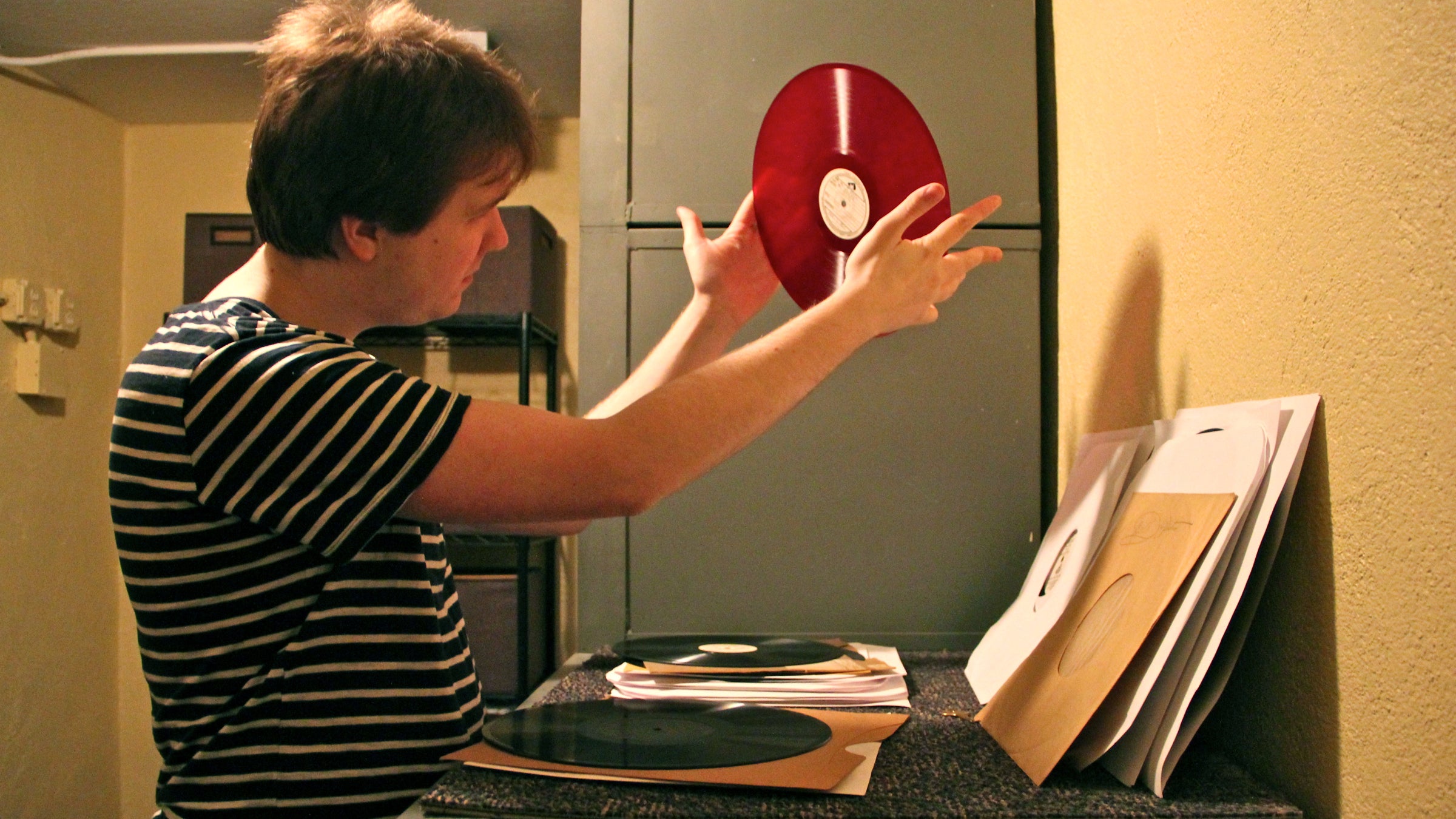Encore for iconic Camden recording company — with a new spin
Listen
Graham Alexander looks through some of the old Victor records stored in the Vault, a bank building in Berlin, N.J., that he has transformed into a recording studio. (Emma Lee/WHYY)
The history of recorded music has found a home in an unlikely place: a former bank building in Berlin, New Jersey.
The Vault is a small performance venue of the newly revived Victor Talking Machine Company, the first company to make and sell records in 1901.
“As a kid I used to walk down near Camden with my mom,” said Graham Alexander, 26, a South Jersey musician who now owns Victor Talking Machine Company. “I would point to dead factories. She’d say, ‘That was RCA and before that it was Victor.’ ‘What does that mean?'”
Originally, it meant a set of engineering patents earned, bought, and litigiously cajoled under one roof along the Camden Waterfront. The Victor Talking Machine Company figured out how to mass-produce acetate records, then how to beat Thomas Edison’s wax cylinder format in the marketplace.
Artists from around the world flocked to the sprawling Victor campus in Camden to be recorded. Large studios were built to accommodate entire orchestras. Most of the buildings are now gone; many that remain are badly neglected.
“It’s a heritage spot. It’s beautiful. It was designed by the same people who became the heads of EMI in England,” said Alexander. “Camden is so connected to the birth of the recording industry, and people don’t know.”
Alexander made his nut performing on Broadway in two musicals based on the Beatles: “Rain,” and “Let It Be.” He played Paul. He also writes and records his own material; his second album, “Repeat Deceiver,” was released last year.
He and a group of partners were able to buy Victor Talking Machine Company, Victrola, and His Master’s Voice at auction for a song. Legally, those companies are empty names. They have no assets.
Historically, the names still have resonance. Alexander is scooping up any existing records with the Victor label he can find, including masters and duplicates. That’s not easy. In the early 1960s, its parent company, RCA, decided the entire Victor catalogue was not worth storing. A warehouse holding about 300,000 discs was wholly dynamited.
There were “clouds of debris, black and metal chunks flying out the windows,” according to witnesses at the time. RCA then bulldozed the whole pile of debris — warehouse, records and all — into the Delaware River and built a shipping dock on top.
“They deemed that every recording Victor made from 1900 — 1945, for the most part, was worth no more than the fill of a cement dock,” said Alexander.
Saved from the drink
Before destroying a half-century of music, RCA allowed employees to grab what they wanted. The Duke Ellington masters were snatched up by an RCA subsidiary in Europe. Somebody made sure the Enrico Caruso discs were safe.
But Lead Belly? The Original Dixieland Jass Band? Most of the blues and jazz masters likely drowned in the Delaware. What was saved is scattered among descendants, collectors, and the vaults of RCA’s subsidiary companies.
Alexander has about 10,000 discs, about 1,000 of them catalogued. Each is stamped with a matrix number, but some numbers do not appear on any existing log. Alexander has a metal master — the disc used to make the initial cut from a live performance — with no label. It is “Limehouse Blues” by an unknown jazz band, likely recorded by Victor in the 1930s.
Alexander plays it for anybody who cares to hear, in hopes somebody will be able to identify the performer.
“The playing style is distinct,” said Alexander, smiling down at the spinning silver disc on a vintage turntable. “And it’s very good. You know what I mean? These are top human beings. “
Alexander plans to form one of his vintage company names, His Master’s Voice, into a nonprofit to release much of the Victor collection as online streaming files.
As Victor Talking Machine Company, Alexander wants to sign new bands to make and release new records, “finding artists really looking to make great music organically, with instruments, less reusing old records.”
This all happens at The Vault, the former bank building in Berlin that Alexander has transformed into a small museum and performance space that can accommodate a few dozen people.
“To bring people into a museum is one thing, but we want to give every side of the music industry,” said Alexander. “By have a little performing arts stage, it bring it back to what matters: humans performing music.”
The Vault just started staging concerts and is still finding its feet. Currently the lineup is mostly Alexander, himself.
WHYY is your source for fact-based, in-depth journalism and information. As a nonprofit organization, we rely on financial support from readers like you. Please give today.





